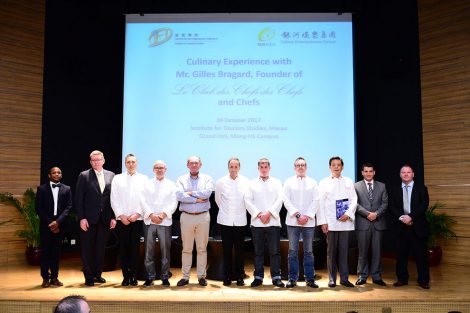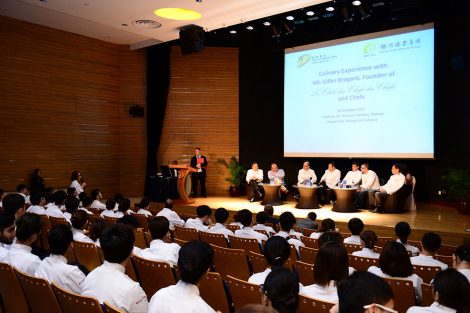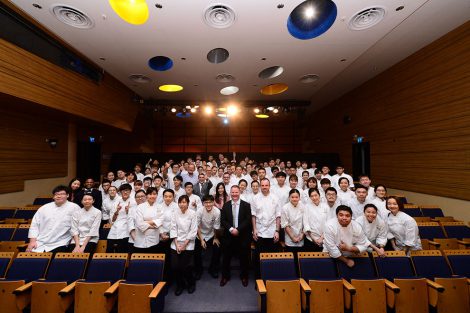French statesman Jean-Jacques Régis de Cambacérès famously asked: “How can one make friends without exquisite dishes? It is mainly through the table that one governs.” Today, good food and wielding influence from the pinnacle of political power still go together, much as he observed 200 years ago. Just ask the members of Le Club des Chefs des Chefs, an association of the chefs de cuisine to some of the most important heads of state in the world.
The club’s founder, Gilles Bragard, says being chef to a president or monarch is exceptional. “There is only one person per country doing this job,” he says. “These are not chefs from a regular restaurant or TV celebrities. They are serving their country.”
A party representing Le Club des Chefs des Chefs visited IFT on 30 October. It included 6 chefs who related tales of their experiences at the summit of power to a gathering of more than 90 students studying for a Bachelor’s Degree in Culinary Arts Management.
“In every country that we go to for our annual meetings, the respective head of state receives the chefs, to pay tribute to those working hard to serve their presidents, kings or princes, and to facilitate diplomatic relationships between heads of state when they meet,” Mr. Bragard says. “The table is very important in politics.”
Le Club des Chefs des Chefs was established in 1977. Its name is French for “the club for head cooks of heads of state”. Among the main purposes of the club are the preservation of important culinary traditions and the protection of the origins of each national cuisine.
“We consider the club as the G-20 of cuisine,” Mr. Bragard says. “It is a restricted club. We have around 25 member-chefs. To be a member, you need to be chef to an incumbent head of state.”
The founder says the club promotes friendship and cooperation among its members. “For instance, when the President of France visits Monaco, the chef of the Prince of Monaco calls his colleague from the Elysée Palace to know what food the French President likes,” Mr. Bragard says. “It is what we call the Blue Line; a direct line between the chefs of heads of state, for them to communicate.”
The club also puts on events for charity. While in Macao, its representatives prepared a gala dinner at the Ritz-Carlton, Macau hotel. Some of proceeds went to Orbis, the charity dedicated to preserving the eyesight of people in developing countries.
Singular focus
The President of Le Club des Chefs des Chefs is Chef Christian Garcia, Executive Chef to Prince Albert II of Monaco. Chef Garcia was among the members of the club that gave accounts of their experiences to IFT students.
Chef Garcia says being chef to a head of state is a constant challenge. He says a day at work can consist of putting together a grand luncheon for a visiting foreign dignitary and later preparing a snack for the Prince to eat informally, instead of dinner. “Every day is different,” he says. “That is what makes this job great.”
But being the chef to a head of state does have at least one peculiarity. “We have the same guest every day,” he says. The dishes must suit the tastes of the diner, rather than the chef’s personal preferences. “We need to be creative,” Chef Garcia says.
The chef has worked for more than 30 years in the kitchen of the Prince’s Palace of Monaco, the official residence of the head of state. He began as an intern. Chef Garcia says there is no obvious career path that leads to a position such as his. He advises would-be chefs to heads of state to work hard and make the most of every opportunity they are given to show off their talents.
Working in the Prince’s Palace of Monaco has given Chef Garcia opportunities to cook for some notable politicians, among them the late Nelson Mandela, the anti-Apartheid leader in South Africa who eventually became head of government and head of state.
Chef Garcia loves his job. “What I like the most is when, at the end of a reception, the Prince asks me to meet the guests and they thank me for the food. Having satisfied them is the most important thing for me,” he says.
Chef Garcia is just as gratified by preparing a successful private lunch for the Prince’s children. “They come to the kitchen to thank us,” he says. “That is our job: to satisfy guests both in official and private settings.”











